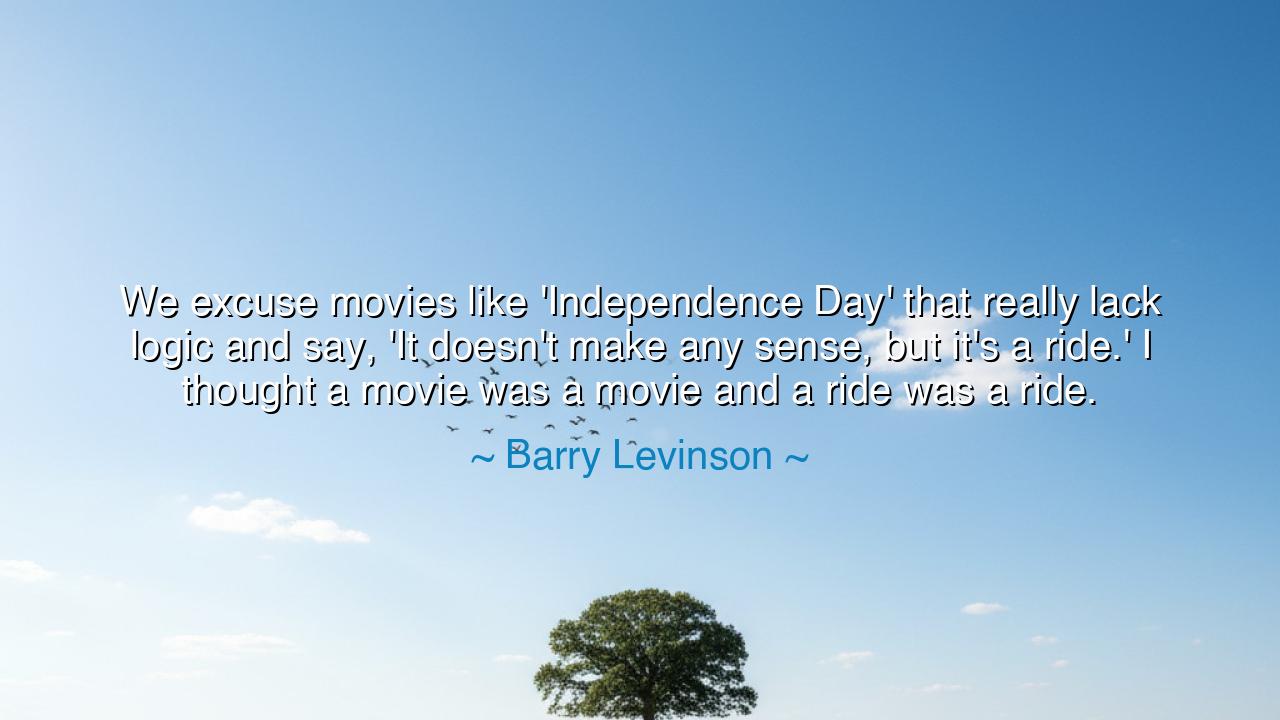
We excuse movies like 'Independence Day' that really lack logic
We excuse movies like 'Independence Day' that really lack logic and say, 'It doesn't make any sense, but it's a ride.' I thought a movie was a movie and a ride was a ride.






The words of Barry Levinson, when he said, “We excuse movies like ‘Independence Day’ that really lack logic and say, ‘It doesn’t make any sense, but it’s a ride.’ I thought a movie was a movie and a ride was a ride,” strike like a quiet lament for an art that has forgotten its soul. Beneath his observation lies not contempt, but sorrow — the sorrow of a storyteller who has witnessed the transformation of cinema from a mirror of human truth into a spectacle of sensation. Levinson’s words are a meditation on meaning, on art and authenticity, on the fading line between storytelling and distraction. He reminds us that once, the purpose of art was not merely to dazzle the eye, but to awaken the spirit.
In his critique of “Independence Day”, Levinson does not scorn its success, but mourns what its success signifies — that audiences have grown content to trade reason for thrill, and substance for spectacle. “It doesn’t make any sense, but it’s a ride,” people say, excusing the hollowness of what once aspired to greatness. In this small phrase, Levinson hears a greater cultural truth: that we have begun to confuse experience with depth, and motion with meaning. We live in an age where the ride — fast, loud, fleeting — has replaced the story, which endures, moves, and transforms. His lament is a call to remember that true art, like life itself, must not only entertain, but enlighten.
To understand the depth of Levinson’s words, one must remember his own place in the lineage of filmmakers. He is a craftsman of narrative — a weaver of emotion and truth, known for works like Rain Man, Good Morning, Vietnam, and Diner. His films did not rely on explosions or spectacle, but on character, humanity, and the subtle rhythm of ordinary moments. He came from an era when the cinema was a sacred gathering place, a temple of empathy where people saw not only stories but themselves. So when he speaks of a movie becoming “a ride,” it is as though a priest were mourning the loss of prayer — the transformation of a ritual of meaning into a carnival of noise.
The ancients would have understood this grief. For even in their time, there was the same temptation — to exchange wisdom for entertainment, and to worship the glitter of the surface instead of the truth beneath. The philosopher Plato warned of the poets who seduced the mind with illusion rather than insight, who created shadows that distracted from the light of truth. So too does Levinson warn us: when we surrender the discipline of thought for the pleasure of sensation, we drift away from the very essence of art — the search for understanding. For what is a film, or any creation, if not a reflection of the soul’s desire to make sense of existence?
Consider the difference between Levinson’s “Rain Man” and a spectacle like Independence Day. One unfolds in quiet rooms, its conflict internal — a man learning to see his brother, and in doing so, to see himself. The other explodes across the sky, its conflict loud and external — humanity versus annihilation. Yet which leaves the deeper mark? The latter excites, but the former transforms. The ride ends when the screen goes dark; the story lingers long after, whispering to the conscience. Levinson’s insight is thus a defense of permanence — of art that does not merely seize the senses, but stays to shape the soul.
And yet, his words carry more than criticism; they carry a challenge. For he is not only speaking of film, but of how we live. We too, in our daily lives, are tempted to treat existence as a ride — to seek constant stimulation, to fill silence with noise, to mistake movement for progress. We scroll, we consume, we rush — and yet, how often do we truly feel? How often do we pause to see the story behind the moment, the meaning within the chaos? Levinson’s lament for the cinema is a lament for us all: that we have grown more entertained than enlightened, more distracted than awakened.
So, O listener, take this lesson deeply into your heart. Do not mistake the ride for the journey. Seek stories — in art, in others, in your own life — that challenge, that stir, that make you think and feel beyond the surface. Honor the creators who pursue truth over trend, who build with patience rather than with noise. And when you watch, read, or live, ask not only, “Was it fun?” but “What did it teach me? What did it awaken within me?” For joy without meaning fades like a spark in the wind, but truth once kindled endures like flame in the heart.
Thus, the teaching of Barry Levinson endures: that art, like life, must be more than a ride. A ride thrills and ends; a story enlightens and remains. Let us, therefore, be the guardians of meaning in an age of spectacle, the seekers of truth amid the noise of illusion. For only when we choose depth over dazzle, reflection over reaction, can we restore both cinema — and our souls — to their rightful nobility.






AAdministratorAdministrator
Welcome, honored guests. Please leave a comment, we will respond soon